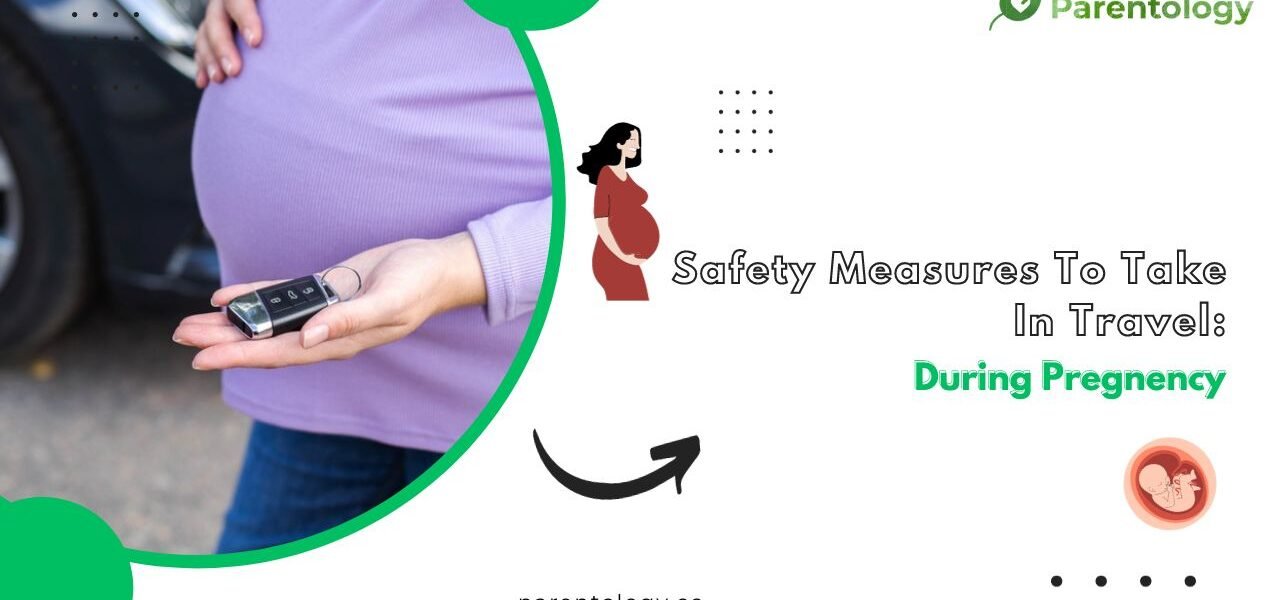Pregnancy is a beautiful journey, but it often prompts questions about travel safety. Many expecting mothers wonder about the risks and precautions associated with traveling during pregnancy, they have generally a question in mind “is it safe to travel in pregnancy?” Understanding the safety measures to take while traveling during this time is crucial for both the mother’s and the baby’s well-being.
Is It Safe to Travel in Pregnancy?
Pregnancy itself is not an impediment to travel; however, certain considerations and safety measures should be observed for a smooth and secure journey. Here are key insights and safety precautions expectant mothers should keep in mind when planning travel during pregnancy:
Safety Measures for Traveling During Pregnancy
1. Consult Your Healthcare Provider:
- Description: Before planning any travel, it’s imperative to consult your obstetrician or healthcare provider. They can provide personalized advice based on your specific pregnancy needs, trimester, and any potential risks associated with travel.
- Importance: Your doctor’s guidance is vital to ensure a safe and healthy trip for both you and your baby.
2. Choose the Right Timing:
- Description: Opt for travel during the second trimester, commonly considered the safest period for pregnant women to travel. This phase often brings more comfort and stability compared to the first trimester’s morning sickness or the third trimester’s fatigue and increased risk of preterm labor.
- Importance: Timing your travel during the second trimester can mitigate potential discomfort and health risks.
3. Plan Your Mode of Transportation Carefully:
- Description: Whether traveling by car, train, plane, or ship, ensure you are comfortable and have ample space to move around. Frequent breaks during long drives or flights help in circulation and reduce the risk of blood clots.
- Importance: Choosing a comfortable mode of transportation is crucial for the expecting mother’s physical well-being.
4. Pack Essentials and Medical Documentation:
- Description: Pack necessary medications, prenatal vitamins, and copies of your medical records. Also, carry your healthcare provider’s contact information in case of emergencies.
- Importance: Being prepared with essential items and medical documentation ensures you are equipped to manage any unforeseen situations while away from home.
5. Stay Hydrated and Mindful of Diet:
- Description: Hydration and maintaining a healthy diet are essential during pregnancy. Carry water and healthy snacks to keep yourself nourished and energized throughout the journey.
- Importance: Proper hydration and a balanced diet are critical for the well-being of both the mother and the growing baby.
6. Avoid High-Risk Destinations:
- Description: Steer clear of areas with potential health risks, such as regions with prevalent diseases, extreme altitudes, or locations lacking adequate medical facilities.
- Importance: Avoiding high-risk destinations helps minimize potential health complications during travel.
7. Practice Proper Seat Belt Use:
- Description: While traveling by car, ensure proper seat belt use. Wear the lap belt under the abdomen and the shoulder belt between the breasts.
- Importance: Correct seat belt usage protects the mother and baby from potential injuries in case of sudden stops or accidents.
8. Prioritize Comfortable Accommodations:
- Description: When booking accommodations, opt for comfortable and safe places to stay. Consider factors such as accessibility, proximity to medical facilities, and amenities that cater to expectant mothers’ needs.
- Importance: Ensuring a comfortable and relaxing environment during your trip is essential for managing the physical demands of pregnancy.
9. Know Emergency Contact Information:
- Description: Familiarize yourself with emergency contact numbers and medical facilities at your travel destination. Locate nearby hospitals or clinics in case immediate medical attention is necessary.
- Importance: Being informed about local healthcare services can be invaluable during emergencies.
10. Minimize Exposure to Infections:
- Description: Protect yourself from infections by practicing good hygiene. Carry hand sanitizers, tissues, and disinfectant wipes to maintain cleanliness, especially when traveling to crowded or public places.
- Importance: Reducing the risk of infections is crucial to safeguard both maternal and fetal health.
Navigating Travel During Pregnancy: Solutions of is it Safe to Travel in Pregnancy
11. Comfortable Clothing and Footwear:
- Description: Wear loose, comfortable clothing during travel to avoid constriction and enhance circulation. Choose supportive footwear to minimize discomfort and potential swelling of feet and ankles.
- Importance: Proper attire contributes significantly to comfort, reducing the risk of discomfort or health issues during travel.
12. Hygiene and Food Safety:
- Description: Maintain proper hygiene practices, including frequent hand washing and avoiding risky foods to prevent foodborne illnesses. Opt for freshly prepared, well-cooked meals from reputable establishments.
- Importance: Hygiene and safe food practices are crucial for preventing infections that could harm both the mother and the baby.
13. Consider Travel Insurance:
- Description: Explore travel insurance options that offer coverage for pregnancy-related complications or emergencies during your trip. Ensure the policy comprehensively covers your needs.
- Importance: Travel insurance provides financial security and access to healthcare services in unforeseen medical situations.
14. Stay Well-Rested and Relaxed:
- Description: Prioritize rest and relaxation during your travels. Take breaks, nap if needed, and practice stress-relieving activities to maintain well-being.
- Importance: Adequate rest and stress management are vital for the physical and emotional health of expectant mothers.
15. Pack Essentials in Your Carry-On:
- Description: Keep essential items, such as medications, comfortable clothing, snacks, and a water bottle, easily accessible in your carry-on bag during flights or long journeys.
- Importance: Having necessary items within reach ensures comfort and convenience, especially during extended travel times.
16. Engage in Light Exercise:
- Description: Incorporate light stretching or simple exercises recommended by your healthcare provider to promote circulation and alleviate discomfort during travel.
- Importance: Gentle exercises aid in reducing the risk of blood clots and muscle stiffness associated with prolonged sitting.
17. Be Mindful of Environmental Factors:
- Description: Consider environmental factors such as temperature extremes, humidity, and air quality at your destination. Dress appropriately and stay hydrated to adapt to different climates.
- Importance: Being aware of environmental conditions helps in planning and adapting to potential challenges.
18. Plan for Comfortable Seating:
- Description: If possible, pre-book seats with extra legroom or aisle seats for easier access and mobility during the journey.
- Importance: Comfortable seating arrangements contribute significantly to the comfort and convenience of the travel experience.
19. Inform Travel Providers of Your Pregnancy:
- Description: Inform airline staff, hotel personnel, or tour operators about your pregnancy to receive necessary assistance or accommodations.
- Importance: Notifying travel providers ensures they can offer appropriate support and guidance during your trip.
20. Stay Informed About Local Healthcare Services:
- Description: Research and note down contact details and locations of healthcare facilities or English-speaking doctors at your travel destination.
- Importance: Having access to medical services and resources is crucial in case of unforeseen medical needs.
FAQs: Answers to Common Questions about is it Safe to Travel in Pregnancy
Q 1. Can I Travel During My First Trimester?
Ans 1: While possible, it’s advisable to consult your doctor due to potential morning sickness and fatigue.
Q 2. Are There Activities I Should Avoid When Traveling?
Ans 2: Yes, avoid strenuous activities and prolonged standing or sitting. Opt for moderate physical movement instead.
Q 3. Should I Take Travel Insurance?
Ans 3: Yes, obtaining travel insurance with pregnancy coverage is recommended for unexpected medical emergencies.
Q 4. Is Air Travel Safe During Pregnancy?
Ans 4: Generally, air travel is safe, but consult your doctor before planning any flights, especially during the third trimester.
Q 5. Can I Travel Internationally During Pregnancy?
Ans 5: International travel is possible, but be cautious of specific country risks and access to healthcare.
Q 6. How Often Should I Take Breaks During Long Journeys?
Ans 6: Aim for breaks every 1-2 hours to stretch your legs and maintain circulation, especially during extended trips.
Q 7. Is Cruise Travel Safe When Pregnant?
Ans 7: Consult your healthcare provider; cruises can be comfortable but ensure adequate medical facilities on board.
Q 8. Are Vaccinations Required Before Traveling?
Ans 8: Vaccinations may be necessary for certain destinations; discuss with your doctor before traveling.
Q 9. Can Stress Affect Pregnancy During Travel?
Ans 9: Yes, excessive stress can impact pregnancy; prioritize relaxation and stress-reducing activities during travel.
Q 10. What Should I Do in Case of Emergency While Traveling?
Ans 10: Contact emergency services and seek immediate medical attention. Carry medical documents for reference.
Conclusion
Traveling during pregnancy is feasible with adequate precautions and proper planning. By adhering to safety measures, seeking medical guidance, and being prepared, expectant mothers can enjoy a safe and comfortable travel experience, creating cherished memories during this remarkable journey of motherhood.
For further insights and expert advice on pregnancy-related topics, visit Parentology to explore more informative resources.





